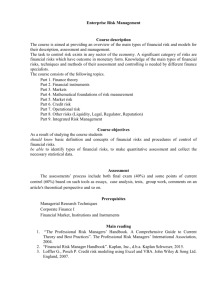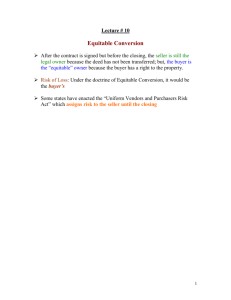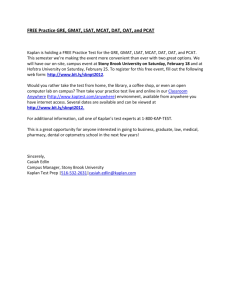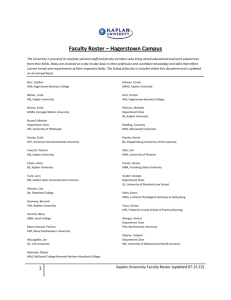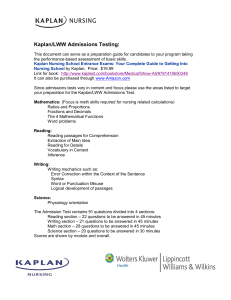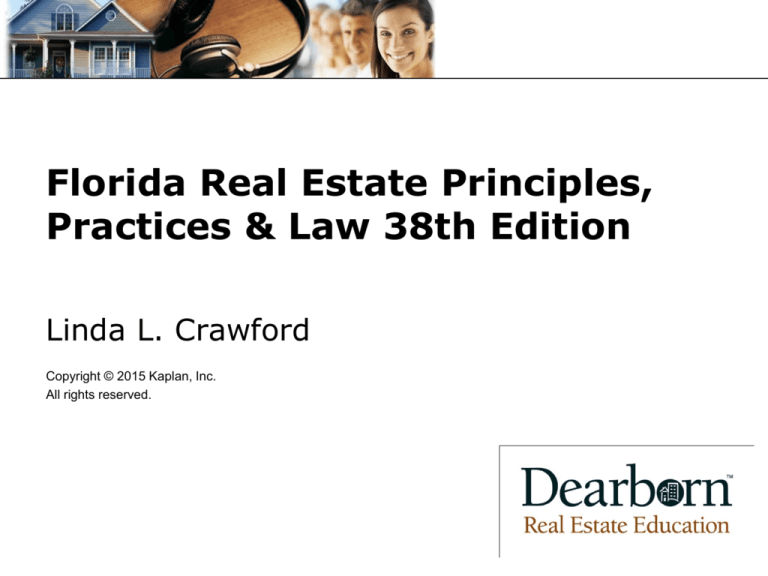
Florida Real Estate Principles,
Practices & Law 38th Edition
Linda L. Crawford
Copyright © 2015 Kaplan, Inc.
All rights reserved.
Chapter 9
Title, Deeds, and Ownership
Restrictions
Title to Real Property
• A person holds vested ownership rights in
property
– Title A legal concept signifying ownership to the
collection of rights called an estate
– Equitable title The beneficial interest that
implies a person will receive legal title at a future
date; the interest that a buyer receives upon
executing a contract prior to title closing
©2015 Kaplan, Inc.
Acquiring Legal Title
• Alienation
Act of transferring ownership, title, or an
interest in real property
• Alienation may be
– Voluntary With the owner’s control and consent
– Involuntary Without owner’s control and
consent
©2015 Kaplan, Inc.
Voluntary Alienation
• Deed
– A written instrument used to convey an interest
in real property
– Conveys legal title
• Will
– Testate Deceased person prepared will before
death
– Testator (testatrix) person who leaves a will
©2015 Kaplan, Inc.
Involuntary Alienation
• Descent When person dies without leaving a will
(intestate) property descends to heirs
• Escheat provides for government to take property
of owner who dies intestate and has no known
heirs
• Adverse possession when the true owner sleeps
on owner’s rights
• Eminent domain gives government right to take
property for public purpose through a
condemnation proceeding
©2015 Kaplan, Inc.
Conditions for Adverse Possession
H ostile possession
Open possession
T axes paid by adverse possessor
C laim of title
A dverse possession for 7 years
Notorious and flagrant public
possession
©2015 Kaplan, Inc.
Types of Notice
Actual
Direct knowledge acquired in the course of
a transaction
Constructive (legal notice)
Recording in the public records
Acknowledgment Formal declaration before a
notary public by grantor that the signing is a free
act
©2015 Kaplan, Inc.
Condition of Title
Chain of title is complete successive history
Title search
•
Abstract of title is a summary report of title
search found in public record
Opinion of title
• Executed by an attorney who has studied the
abstract
©2015 Kaplan, Inc.
Title Insurance
• Contract that protects policyholder from
losses from defects in title
• Florida does not require title insurance
• Licensees are not qualified to give opinion of
title
• Licensees first must obtain a current opinion
from an attorney before quoting an opinion
that title is good
©2015 Kaplan, Inc.
Title Insurance
Owner’s Policy
• Issued for purchase
price
• Protects new owner
and owner’s heirs
• Not transferable to
another owner
• One-time premium
Lender’s Policy
• Issued for unpaid
mortgage amount
• Protects lender against title
defects
• Transferable (assignable)
• Protects lender up to
outstanding loan balance
• Most lenders require as a
condition of making loan
• One-time premium
©2015 Kaplan, Inc.
Deeds
• A written instrument that conveys title
• Two parties to a deed
– Grantor – owner giving title
– Grantee – new owner receiving title
• Must be signed by a competent grantor and
two witnesses
– Grantee does not sign deed
©2015 Kaplan, Inc.
Elements of a Deed
• Consideration—good or valuable
• Execution—signatures of competent grantor
and two witnesses
• Description of property
• Delivery and acceptance—voluntary
• Interest or estate being conveyed
• Names of grantee and grantor
• Granting clause and others
©2015 Kaplan, Inc.
Clauses in a Deed
• Premises names parties
– Date of deed
– Granting clause – words
to convey title
• Habendum
– “To have and to hold”
– Type of estate conveyed
• “Forever” = fee
simple
• “Life of the grantee”
= life estate
©2015 Kaplan, Inc.
Clauses in a Deed
• Seisin
– Grantor owns
– Grantor has right to
convey title
• Covenant against
encumbrances
– Property is free from
liens or other
encumbrances
unless noted on the
deed
©2015 Kaplan, Inc.
Statutory Deeds
• Quitclaim deed
– Grantor quitclaims to the grantee all of grantor’s
rights, title, and interest
– Used to clear clouds on title
– Remise, release, and quitclaim
– Grantor does not claim ownership
• No Covenant of Seisin
– No warranty to defend title
– Suit to quiet title
©2015 Kaplan, Inc.
Statutory Deeds
• Bargain and sale deed
– Granting, habendum and seisin
– No future warranty
– Conveys all the title the grantor has, but it does
not protect grantee from clouds or claims on the
title
©2015 Kaplan, Inc.
Statutory Deeds
Special warranty deed
Grantor does not warrant title except against
acts by the grantor or grantor’s representative
Used by large corporations when selling property
and by lenders selling foreclosed property
©2015 Kaplan, Inc.
Statutory Deeds
• General warranty deed
– Full covenant and warranty deed
– Contains all covenants and warranties available
• Quiet enjoyment—peaceful possession undisturbed by
claims of title
• Further assurance—grantor will deliver legal instrument
if required
• Warranty forever—to defend grantee’s title
©2015 Kaplan, Inc.
Special Purpose Deeds
• Personal representative’s deed
– Personal representative is appointed by will or by
court to settle estate of deceased person
• Guardian’s deed
– Guardian acts on behalf of a minor
• Committee’s deed
– Used when owner is legally incompetent
• Certificate of title given at a foreclosure sale
©2015 Kaplan, Inc.
Legal Requirements
• General warranty deed required unless
otherwise stated in contract
• Transfer of title is not effective until the
deed is delivered and accepted
©2015 Kaplan, Inc.
Ownership Limitations and Restrictions
Government
• Police power
Private
• Deed restrictions
• Easements
• Leases
• Liens
– Zoning Ordinances
– Building Codes
– Health Ordinances
• Eminent domain
– Fair Price
– Condemnation
proceeding
• Taxation (property)
©2015 Kaplan, Inc.
Deed Restrictions
• Deed restrictions are part of a deed
– Affect only one particular property
• Restrictive covenants often recorded with
the plat map
– Affect all the properties in a subdivision
©2015 Kaplan, Inc.
Easements
• Right to use portion of owner’s land for a
specific purpose
• Does not convey ownership (possession)
• Terminated by agreement, abandonment,
court order
©2015 Kaplan, Inc.
Types of Easements
• Created by written agreement
– Easement Appurtenant
• Benefits adjacent parcel of land
– Easement In Gross
• Benefits individual or business entity
• Created through a court of law
– Easement By Necessity
• Landlocked
– Easement By Prescription
• 20 years open, continuous, noninterrupted use
©2015 Kaplan, Inc.
Encroachment
• Unauthorized use of
another’s property
– Fence or garage
located beyond
boundary
– Implied easement
after seven years
©2015 Kaplan, Inc.
Leases
• Grants right of possession and use to lessee
(tenant)
– Does not transfer ownership interest
• Must be written and signed to be
enforceable if over one year
– Also requires signatures of 2 witnesses if over
1 year
• Licensees may use fill-in-the-blank lease
forms approved by FL Supreme Court
©2015 Kaplan, Inc.
Types of Leases
• Gross
– Tenant pays fixed rent
• Net
– Tenant pays fixed rent
plus building expenses
• Ground
– Lease on land
©2015 Kaplan, Inc.
Percentage Lease
• Percentage
• Example:
– Minimum rent may
be either a gross or
net rent
– Additional rent
based on gross sales
– Commonly used for
large retail stores
• Monthly minimum rent of
$1,000 plus 3 percent
annual gross sales in excess
of $325,000. Gross sales
were $450,700.
• $450,700 - $325,000 =
$125,700
• $125,700 x 3% = $3,771
• $1,000 x 12 months =
$12,000 rent + $3,771 =
$15,771 total rent
©2015 Kaplan, Inc.
Variable Lease
• Rent changes at set
times
• Rent adjustments
tied to a price index
• Also called index
lease
• Example
Rent is $12 per square foot
with index of 1.5. Index
increases to 1.8.
1.8 ÷ 1.5 = 1.20
1.20 x $12 per square foot
= $14.40 adjusted rental
rate
©2015 Kaplan, Inc.
Assignment and Sublease
• Assignment
– When tenant assigns all of leased property for
remainder of lease
• Sublease
Two ways to sublet property
1.Tenant assigns a portion of leased property
2.Tenant assigns all property for less than
remaining term
©2015 Kaplan, Inc.
Liens
• Right to have a debt satisfied by some
property owned by the debtor
• Lienholder (lienor) may have the property
sold to pay the debt of the owner (lienee)
• Liens are recorded in the public records
(constructive notice)
©2015 Kaplan, Inc.
Voluntary and Involuntary Liens
Voluntary
Involuntary
• Mortgage
• Vendor’s lien
• Judgment liens
• Tax liens
• Construction liens
©2015 Kaplan, Inc.
General and Specific Liens
General
• Judgment liens
• IRS liens
• Federal estate tax
liens
Specific
• Property tax liens
• Special assessment
liens
• Mortgages
• Vendor’s lien
• Construction
(mechanic’s) lien
©2015 Kaplan, Inc.
Lien Priority
• Superior liens
– Property tax
– Special assessments
– Federal estate tax
• Junior liens
– Priority by recording date
Construction lien is an
exception
– Subordination agreement
©2015 Kaplan, Inc.


